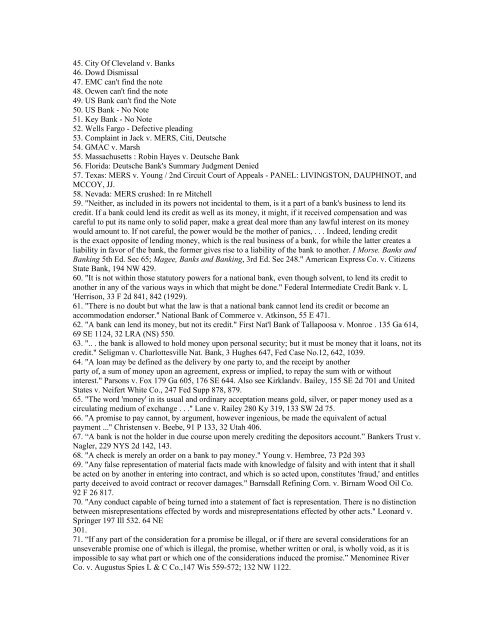Mortgage-KillerEX
Mortgage-KillerEX
Mortgage-KillerEX
You also want an ePaper? Increase the reach of your titles
YUMPU automatically turns print PDFs into web optimized ePapers that Google loves.
45. City Of Cleveland v. Banks<br />
46. Dowd Dismissal<br />
47. EMC can't find the note<br />
48. Ocwen can't find the note<br />
49. US Bank can't find the Note<br />
50. US Bank - No Note<br />
51. Key Bank - No Note<br />
52. Wells Fargo - Defective pleading<br />
53. Complaint in Jack v. MERS, Citi, Deutsche<br />
54. GMAC v. Marsh<br />
55. Massachusetts : Robin Hayes v. Deutsche Bank<br />
56. Florida: Deutsche Bank's Summary Judgment Denied<br />
57. Texas: MERS v. Young / 2nd Circuit Court of Appeals - PANEL: LIVINGSTON, DAUPHINOT, and<br />
MCCOY, JJ.<br />
58. Nevada: MERS crushed: In re Mitchell<br />
59. "Neither, as included in its powers not incidental to them, is it a part of a bank's business to lend its<br />
credit. If a bank could lend its credit as well as its money, it might, if it received compensation and was<br />
careful to put its name only to solid paper, make a great deal more than any lawful interest on its money<br />
would amount to. If not careful, the power would be the mother of panics, . . . Indeed, lending credit<br />
is the exact opposite of lending money, which is the real business of a bank, for while the latter creates a<br />
liability in favor of the bank, the former gives rise to a liability of the bank to another. I Morse. Banks and<br />
Banking 5th Ed. Sec 65; Magee, Banks and Banking, 3rd Ed. Sec 248." American Express Co. v. Citizens<br />
State Bank, 194 NW 429.<br />
60. "It is not within those statutory powers for a national bank, even though solvent, to lend its credit to<br />
another in any of the various ways in which that might be done." Federal Intermediate Credit Bank v. L<br />
'Herrison, 33 F 2d 841, 842 (1929).<br />
61. "There is no doubt but what the law is that a national bank cannot lend its credit or become an<br />
accommodation endorser." National Bank of Commerce v. Atkinson, 55 E 471.<br />
62. "A bank can lend its money, but not its credit." First Nat'l Bank of Tallapoosa v. Monroe . 135 Ga 614,<br />
69 SE 1124, 32 LRA (NS) 550.<br />
63. ".. . the bank is allowed to hold money upon personal security; but it must be money that it loans, not its<br />
credit." Seligman v. Charlottesville Nat. Bank, 3 Hughes 647, Fed Case No.12, 642, 1039.<br />
64. "A loan may be defined as the delivery by one party to, and the receipt by another<br />
party of, a sum of money upon an agreement, express or implied, to repay the sum with or without<br />
interest." Parsons v. Fox 179 Ga 605, 176 SE 644. Also see Kirklandv. Bailey, 155 SE 2d 701 and United<br />
States v. Neifert White Co., 247 Fed Supp 878, 879.<br />
65. "The word 'money' in its usual and ordinary acceptation means gold, silver, or paper money used as a<br />
circulating medium of exchange . . ." Lane v. Railey 280 Ky 319, 133 SW 2d 75.<br />
66. "A promise to pay cannot, by argument, however ingenious, be made the equivalent of actual<br />
payment ..." Christensen v. Beebe, 91 P 133, 32 Utah 406.<br />
67. “A bank is not the holder in due course upon merely crediting the depositors account.” Bankers Trust v.<br />
Nagler, 229 NYS 2d 142, 143.<br />
68. "A check is merely an order on a bank to pay money." Young v. Hembree, 73 P2d 393<br />
69. "Any false representation of material facts made with knowledge of falsity and with intent that it shall<br />
be acted on by another in entering into contract, and which is so acted upon, constitutes 'fraud,' and entitles<br />
party deceived to avoid contract or recover damages." Barnsdall Refining Corn. v. Birnam Wood Oil Co.<br />
92 F 26 817.<br />
70. "Any conduct capable of being turned into a statement of fact is representation. There is no distinction<br />
between misrepresentations effected by words and misrepresentations effected by other acts." Leonard v.<br />
Springer 197 Ill 532. 64 NE<br />
301.<br />
71. “If any part of the consideration for a promise be illegal, or if there are several considerations for an<br />
unseverable promise one of which is illegal, the promise, whether written or oral, is wholly void, as it is<br />
impossible to say what part or which one of the considerations induced the promise.” Menominee River<br />
Co. v. Augustus Spies L & C Co.,147 Wis 559-572; 132 NW 1122.












![[Pham_Sherisse]_Frommer's_Southeast_Asia(Book4You)](https://img.yumpu.com/38206466/1/166x260/pham-sherisse-frommers-southeast-asiabook4you.jpg?quality=85)




